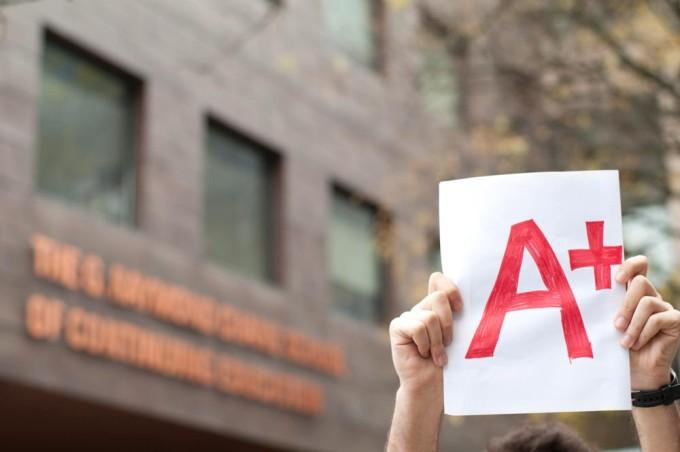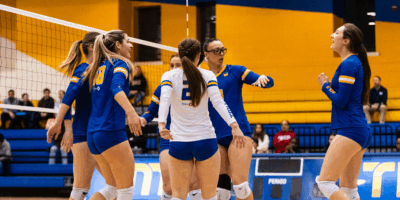For Chang School instructors, negative student feedback could mean the end of their teaching days. News Editor Mariana Ionova looks at whether profs are hiking up marks in hopes of getting A’s on their instructor evaluations
Lack of job security for Chang School instructors may be pushing profs to go easy on students in a bid to keep them happy.
Chang School Continuing Education instructors are contracted on a term-by-term basis, with an hourly wage of $133.10 for a total of 42 hours each semester. But once the term is over, they must apply again to be considered for another contract for the following term.
Linda Kowel, manager of instructor relations, said Chang School instructors are in “contingent teaching” positions, which are not designed to provide job stability but to meet the school’s teaching needs.
“It’s not career teaching,” said Kowel. “At the Chang School, that’s not our intent. We offer courses and we are looking for instructors to teach those courses.”
When an instructor reapplies for a teaching position, the school considers factors like their academic credentials, experience in their field and prior post-secondary teaching experience. But they’re also asked to demonstrate they can successfully engage with students by attaching faculty course surveys, which are considered confidential and are not available to anyone other than the instructor.
“Definitely, student feedback is very important,” said Saeed Nejatian, program director for engineering, architecture and science. “Obviously the voice of the students plays a solid role. If you get negative points, it’s something that we definitely consider but the positive feedback is also considered.”
This could lead instructors to associate positive student feedback with a higher chance of being hired for another term, according to Nejatian.
“Everybody in their right mind would think that way,” he said. “If they get good feedback from their students, the chances of being considered for another opportunity will be there. If they get negative comments, they know that — or at least, I would know that — those chances are not going to be good.”
While Kowel acknowledges that students who are satisfied with their grades may produce more favourable course faculty surveys, the school tried to keep the process “as objective as possible.”
“We always recommend that evaluation surveys be done before the end of term because, when students get their final grades, they may be more or less happy,” she said.
But some students claim Chang School instructors are still more forgiving towards students than professors in full-time programs. John Colangelo, who graduated from the business management program last year, took nearly 20 courses at the Chang School throughout his four years at Ryerson. He mainly took them because they were easier to fit into his schedule but the difficulty level of the courses was also a consideration.
“The material is just as difficult but [Chang courses] tend to be more flexible with due dates and more lenient with grading,” he said. “I guess I thought it myself, ‘I have to take this hard course, I’m going to see if it’s offered through the Chang School and, that way, it might be a bit easier.’”
Colangelo remembered that an instructor he had for a statistics course pushed a midterm back one week because the class was not prepared. He noted the process and flexibility was “a little bit like high school.”
Kowel said the school does not evaluate grade scales and does not analyze any data to determine the grade averages produced by specific instructors. “We don’t know if a particular instructor is grading higher or lower than his or her colleagues.”
But Ryerson President Sheldon Levy said one study of Ted Rogers School of Management courses showed marks at the Chang School are in fact lower than those in daytime courses. Nonetheless, he noted that using student satisfaction to evaluate instructors is problematic.
“Students aren’t customers buying a product. If a student has difficulty, doesn’t work and gets a failing grade and they say they’re not satisfied, it’s not like they’ve bought a commodity. I think even the notion of student satisfaction has to be looked upon very carefully and not jump to conclusions at all. ”
Kowel said the school tries to enforce quality teaching through classroom observations, where program coordinators evaluate new instructors by sitting in a class. The information from those sessions is then placed in their files and considered during future applications.
“We watch closely, whenever we can get feedback, we will use it. Still, it’s a learning process for a lot of our instructors for the first few terms,” she said.












Bruce
My experience of all Chang School courses is that the academic standards are as low as they come.
I enrolled in a certificate program and have invested enough time and money that I feel obliged to complete it. So I’m phoning it in and still passing with flying colours.
But for anybody that is looking for actual learning, I’d stay away. As an employer, I would disregard any credential from Chang. It also makes me question Ryerson’s overall reputation.
Anna
I agree with Bruce. I will not, however, complete my certificate nor will I recommend it to anyone, because most people have no money to waste. Chang School is a money grabber. Instructors pretend they teach, students pretend they learn. That was my experience and I learned nothing. At some point I just stopped attending classes because the instructor was helpless and I was better at reading PowerPoint slides than she was.